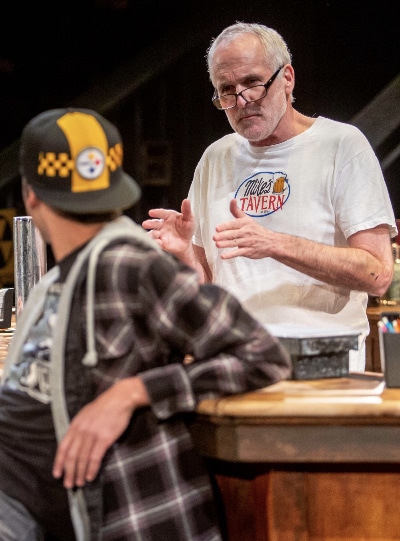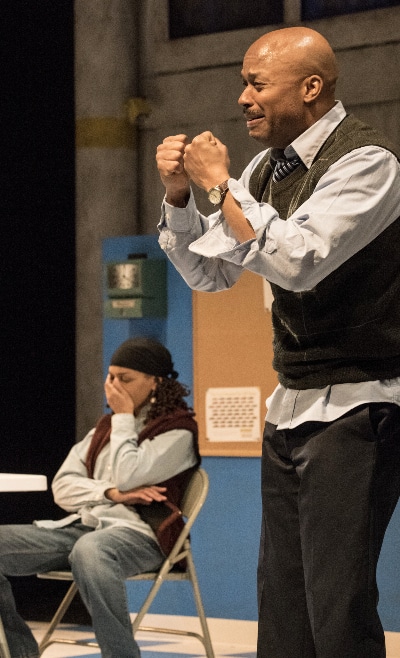DCPA NEWS CENTER
Enjoy the best stories and perspectives from the theatre world today.
Enjoy the best stories and perspectives from the theatre world today.

Two hard-hitting and heart-wrenching plays running successively last spring turned a fierce eye on the ongoing decimation of the American manufacturing industry. And in the process made the power, potential and purpose of live theatre both abundantly and urgently clear.

Jordan Bellow and Sam Gregory in ‘Sweat.’ Photo by Adams VisCom.
Curious Theatre’s Skeleton Crew, by Dominique Morisseau, and the DCPA Theatre Company’s Sweat, a Pulitzer Prize-winner by Lynn Nottage, showed all too clearly what the off-shoring of millions of jobs to lower-wage countries has done to what was once the bedrock of the American economy.
And even though both plays were set a decade ago, when it is estimated that one-third of all U.S. manufacturing jobs vanished between 2001-09, both plays felt as uncomfortably present-tense as today’s trade wars. So present tense, The Denver Post’s Lisa Kennedy wrote of Skeleton Crew, “It’s hard to imagine a time when this quietly riveting drama’s underlying themes won’t have meaning for some portion of our population.” That’s because, as Skeleton Crew Director donnie l. betts put it, “Factory jobs are still going away. People are still being let go. There is a perception out there that the economy is churning right along – but it’s not. Labor is being attacked on every front.”
Skeleton Crew is the third chapter in Dominique Morisseau’s trilogy called The Detroit Projects. It focuses on the soul-crushing moral compromises that are forced upon four workers who are desperate to keep their jobs at an auto plant that’s on the verge of closing.
Sweat, which was crafted from real-life interviews with workers in poverty-stricken Reading, Pennsylvania, is a similarly moving portrait of the working class in decline. It’s set in a bar among co-workers who have spent their lives working, drinking, laughing and fighting together. But when layoffs and picket lines begin to chip away at their trust, they find themselves pitted against each other. Sweat further explores how both community and family foundations erode when drugs thrive and unemployment rises into the 50th percentile.
Tough stories. But tough stories often make for the best theatre. Even when it’s hard to watch.
Tara Falk: ‘I turned my cancer into the most positive thing in the world’

Carjardo Lindsey in Curious Theatre’s ‘Skeleton Crew.’ Photo by Michael Ensminger.
Here, both creative teams worked overtime to deliver ensemble performances for the ages made up of roof-rattling individual achievements across the board.
“I have worked in a factory myself,” said betts, who intentionally lower-cases his name as a personal statement about the ongoing marginalization of black Americans. “These actors captured the grind of what working in a factory embodies. They got how relationships are formed, and how relationships are broken. They got all of that – and that is all a director can ask for.” Sweat Director Rose Riordan added of her ensemble: “I tell you, these actors brought their craft into the room every day in a real and honest and accessible way.”
Skeleton Crew was anchored by Perri Gaffney as an utterly affecting woman Westword’s Juliet Wittman called “one of the most memorable theatrical characters I’ve ever seen.” She’s a cancer survivor and a gay, black woman who, as Kennedy described her, “is a heart encased in sheet-metal armor.”
Cajardo Lindsey (Skeleton Crew) and Cycerli Ash (Sweat) both played former floor workers thrust into management roles that offered them a longer survival rope – but at a terrible cost. Perhaps most agonizing was seeing how a couple of young goofball best friends in Sweat (Derek Jack Chariton and Jordan Bellow) emerge from a well-earned stint in prison – the black man utterly broken; the white man with a face covered in white-supremacy tattoos. The cost of all this brokenness was literally written all over his face.
Wittman singled out every actor in both plays for praise in her reviews. “But the blazing stars of the evening,” she said of Sweat, were Chariton as the newly tattooed supremacist, and Tara Falk as his mother, a proud daughter of German immigrants. “There are times when Chariton’s quivering, almost out-of-control rage at the mere thought of a Latin American’s success is purely terrifying,” Wittman wrote. “And you can’t turn your attention away for a second from Falk’s Tracey, a woman made mean and tight by hardship.”
She called Sweat a triumph for the Denver Center and for Riordan, “and exactly the kind of work we thirst for in these murky times. It’s why audiences should see theatre.”
Betts added: “I can tell you it’s the only reason I make theatre.”

William Oliver Watkins and Derek Jack Chariton. Photo by Adams VisCom.

Kristina Fountaine and Quinn Marchmann, both DCPA Teaching Artists. Photo by Michael Ensminger
The True West Awards, now in their 19th year, began as the Denver Post Ovation Awards in 2001. DCPA Senior Arts Journalist John Moore — along with additional voices from around the state — celebrate the entire local theatre community by recognizing 30 achievements from 2019 over 30 days, without categories or nominations. Moore was named one of the 12 most influential theater critics in the U.S. by American Theatre magazine in 2011. His daily coverage of the DCPA and the Colorado theatre community can be found at MyDenverCenter.Org
